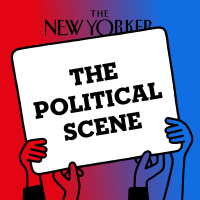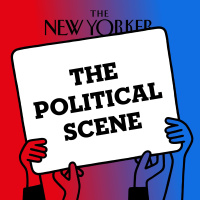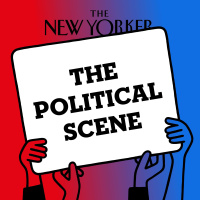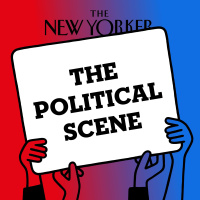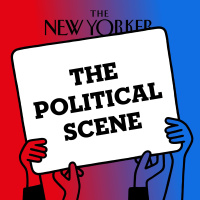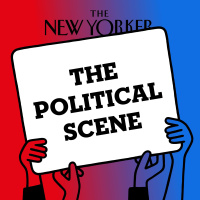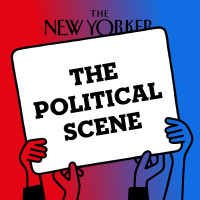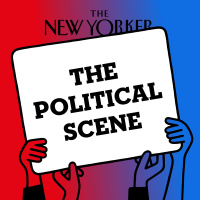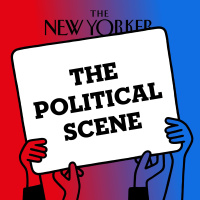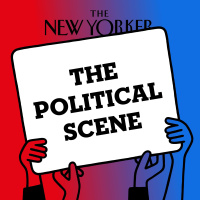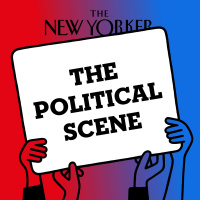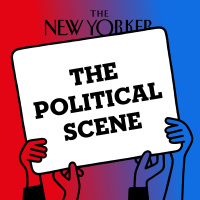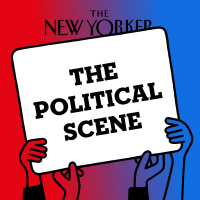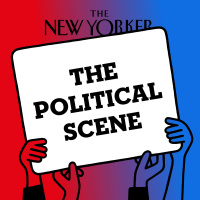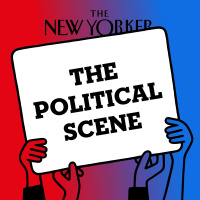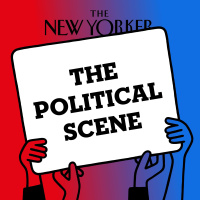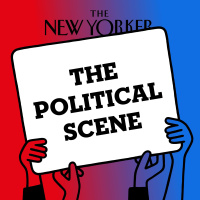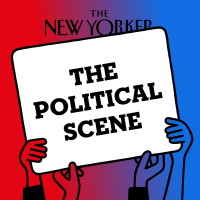Sinopse
A weekly discussion about politics, hosted by The New Yorker's executive editor, Dorothy Wickenden.
Episódios
-
From In the Dark: “Blood Relatives,” an investigative series
31/10/2025 Duração: 46minOn August 7, 1985, five family members were shot dead in their English country manor, Whitehouse Farm. It looked like an open-and-shut case. But the New Yorker staff writer Heidi Blake finds that almost nothing about this story is as it seems. New Yorker subscribers get early, ad-free access to “Blood Relatives.” In Apple Podcasts, tap the link at the top of the feed to subscribe or link an existing subscription. Or visit newyorker.com/dark to subscribe and listen in the New Yorker app. Learn about your ad choices: dovetail.prx.org/ad-choices
-
How Bad Is It?: Why an Antifascism Scholar Fled the Country
30/10/2025 Duração: 01h59sThe New Yorker staff writer Andrew Marantz joins Tyler Foggatt for the latest installment of “How Bad Is It?,” a regular checkup on the health of American democracy. Their guests are the Rutgers historians Mark Bray and Yesenia Barragan, a married couple who recently left the United States after Bray became the target of a right-wing doxing campaign. Bray and Barragan share the events leading up to their decision to leave the country with their family, including the death threats that followed Bray’s addition to a right-wing “professor watch list” and the portrayal of his work in conservative media as promoting political violence. Bray, who is the author of “Antifa: The Anti-Fascist Handbook,” also speaks with Tyler and Andrew about his research into militant antifascism and how those ideas resonate in Donald Trump’s second Presidential term. They discuss the debates his work has sparked over political violence, free speech, and how his arguments about antifascism challenge conventional ideas of liberalism an
-
Zadie Smith on Politics, Turning Fifty, and Mind Control
27/10/2025 Duração: 27minSince Zadie Smith published her début novel, “White Teeth,” twenty-five years ago, she has been a bold and original voice in literature. But those who aren’t familiar with Smith’s work outside of fiction are missing out. As an essayist, in The New Yorker and other publications, Smith writes with great nuance about culture, technology, gentrification, politics; “There’s really not a topic that wouldn’t benefit from her insight,” David Remnick says. He spoke with Smith about her new collection of essays, “Dead and Alive.” “The one thing about talking about essays,” she notes, ruefully, “is you find yourself saying the same thing, but worse—without the commas.” One of the concerns in the book is the role of our devices, and social media in particular, in shaping our thoughts and our political discourse. “Everybody has a different emphasis on [Donald] Trump and what’s going on. My emphasis has been on, to put it baldly, mind control. I think what’s been interesting about the manipulations of a digital age is that
-
How the Trump Administration Made Higher Education a Target
20/10/2025 Duração: 28minThe swiftness and severity with which the Trump Administration has tried to impose its will on higher education came as a shock to many, not least university presidents and faculties from Harvard to U.C.L.A. But for conservatives this arena of cultural conflict has been a long time coming. The staff writer Emma Green has been speaking with influential figures in the current Administration as well as in the larger conservative movement about how they mapped out this battle for Donald Trump’s return to power. “There’s a recognition among the people that I interviewed,” Green tells David Remnick, “that the Administration cannot come in and script to universities: this is what you will teach and this is the degrees that you will offer, and just script it from top to bottom. First of all, that would be not legally possible. And it also, I think in some ways, violates core instincts that conservatives have around academic freedom, because a lot of these people have been on élite campuses and had the experience of b
-
The Ceasefire and the Business of Trump’s Diplomacy
18/10/2025 Duração: 39minThe Washington Roundtable examines the fragile Israel-Hamas ceasefire and the uncertain road ahead, asking to what degree the Trump family’s business interests in the Middle East are shaping American foreign policy. The panel discusses the financial relationships between Qatar, the U.A.E., and Jared Kushner’s private-equity firm, and analyzes the intertwinement of personal profit and global dealmaking in the President’s approach. “The cliché about Trump is that he’s a transactional President,” the staff writer Evan Osnos says. “He’s basically putting that at the center of the diplomatic discussion.” This week’s reading: “The End of Israel’s Hostage Ordeal,” by Ruth Margalit “Donald Trump’s Dream Palace of Puffery,” by Susan B. Glasser “How Will Americans Remember the War in Gaza?,” by Jay Caspian Kang “Donald Trump’s Deep-State Wrecking Ball,” by Andy Kroll “The Last Columbia Protester in ICE Detention,” by Aida Alami Tune in wherever you get your podcasts. Learn about your ad choices: dovetail.prx.org/ad-c
-
How Much More Can Federal Workers Take?
15/10/2025 Duração: 40minThe New Yorker staff writer E. Tammy Kim joins Tyler Foggatt to discuss how the government shutdown is affecting the federal workforce. They talk about how the shutdown began and what it means for hundreds of thousands of civil servants who have been furloughed, laid off, or required to work without pay. They also examine the Administration’s new “reductions in force,” or mass layoffs across key agencies, and how those cuts are being used in the effort to shrink and politicize federal agencies—and how those efforts could weaken not just essential public services but the long-term stability and nonpartisan functioning of the federal government itself. This week’s reading: “Inside the Trump Administration’s Assault on Higher Education,” by Emma Green “The Indictment of Letitia James and the Collapse of Impartial Justice,” by Ruth Marcus “The Real Problem Is How Trump Can Legally Use the Military,” by Jeannie Suk Gersen “The End of Israel’s Hostage Ordeal,” by Ruth Margalit “What Zohran Mamdani Knows About Power
-
Zohran Mamdani Says He's Ready for Donald Trump
13/10/2025 Duração: 47minNext month, New York City may elect as its next mayor a man who was pretty much unknown to the broader public a year ago. Zohran Mamdan, who is currently thirty-three years old and a member of the State Assembly, is a democratic socialist who won a primary upset against the current mayor, Eric Adams, and the former governor Andrew Cuomo, who was trying to stage a political comeback. Mamdani now leads the race by around twenty percentage points in most polls. His run for mayor is a remarkable story, but it has not been an easy one. His campaign message of affordability—his ads widely tout a rent freeze in the city—resonates with voters, but his call for further taxing the top one per cent of earners has concerned the state’s governor, Kathy Hochul. In Congress, Democratic leaders Chuck Schumer and Hakeem Jeffries have yet to even endorse him. “There are many people who will say housing is a human right, and yet it oftentimes seems as if it is relegated simply to the use of it as a slogan,” Mamdani tells David
-
What Does Donald Trump’s “War from Within” Mean in Practice?
11/10/2025 Duração: 40minThe Washington Roundtable discusses the President’s use of the military for political ends, and the “almost unlimited” powers he would unlock by invoking the Insurrection Act, with Kori Schake, the director of foreign-and-defense-policy studies at the American Enterprise Institute. Donald Trump’s decisions—sending the National Guard into American cities over the objections of local leaders and firing Judge Advocate General’s Corps lawyers who help determine if an order is legal—send a message to the historically apolitical armed forces. “What he’s trying to do is circumvent the disciplined senior leadership and appeal for personal loyalty to the younger, noncommissioned and enlisted soldiers,” Schake says. “The pressure from this Administration—there’s been nothing like it since at least the constitutional crisis of 1866-68.” Schake is the author of the forthcoming book “The State and the Soldier: A History of Civil-Military Relations in the United States.” This week’s reading: “Trump, the Self-Styled ‘Presid
-
After James Comey, Who’s Next on Trump’s Revenge Tour?
08/10/2025 Duração: 43minThe New Yorker contributing writer Ruth Marcus joins Tyler Foggatt to discuss Donald Trump’s “revenge tour”—his effort to use the levers of government to settle personal and political scores. They talk about the indictment of the former F.B.I. director James Comey, why legal experts see the case against Comey as alarmingly weak, and how Trump’s campaign of retribution has expanded to include prosecutors, lawmakers, and even the families of his critics. They also consider how Trump’s quest for vengeance is testing the limits of American law, and whether the country can avoid a permanent cycle of political retaliation and lawfare.This week’s reading: “The Flimsy, Dangerous Indictment of James Comey,” by Ruth Marcus “What Will Bari Weiss Do to CBS News?,” by Jon Allsop “Who Can Lead the Democrats?,” by Amy Davidson Sorkin “The Volunteers Tracking ICE in Los Angeles,” by Oren Peleg “Why Israel and Hamas Might Finally Have a Deal,” by Isaac Chotiner Tune in to The Political Scene wherever you get your podcasts.
-
A Conservative Professor on How to Fix Campus Culture
06/10/2025 Duração: 26minRobert P. George is not a passive observer of the proverbial culture wars; he’s been a very active participant. As a Catholic legal scholar and philosopher at Princeton University, he was an influential opponent of Roe v. Wade and same-sex marriage, receiving a Presidential medal from President George W. Bush. George decries the “decadence” of secular culture, and, in 2016, he co-wrote an op-ed declaring Donald Trump “manifestly unfit” to serve as President. Although George disagrees with the Administration’s tactics to change universities’ policies by punishment, he agrees with its contention that campuses have become hotbeds of leftism that stifle debate. He regards this not as a particular evil of the left but as “human nature”: “If conservatives had the kind of monopoly that liberals had,” George tells David Remnick, “I suspect we’d have the same situation, but just in reverse.” His recent book, “Seeking Truth and Speaking Truth: Law and Morality in Our Cultural Moment,” tries to chart a course back towar
-
How Russell Vought Broke the U.S. Government
04/10/2025 Duração: 36minThe Washington Roundtable discusses how this week’s government shutdown can be best understood by looking at the background and influence of Russell Vought, the director of the White House Office of Management and Budget. Vought is a Christian nationalist who served in the first Trump Administration. He was a chief architect of the Heritage Foundation’s Project 2025, and has written that the country is in a “post constitutional moment.” Amid the shutdown, Vought has threatened to lay off federal workers en masse and to withhold funds from Democratic-leaning states. The panel considers whether these moves are not just an expansion of Presidential power but a fiscal “partitioning” of America. This week’s reading:“Donald Trump’s Shutdown Power Play,” by Susan B. Glasser“Can the Democrats Take Free Speech Back from the Right?,” by Jay Caspian Kang“Why Democrats Shut Down the Government,” by Jon Allsop“Is Donald Trump’s Sweeping Gaza Peace Plan Really Viable?,” by Robin Wright“Eric Adams Slips Out the Side Door,”
-
Will the Supreme Court Hand Trump Another Slate of Victories?
01/10/2025 Duração: 47minThe New Yorker contributing writer Jeannie Suk Gersen joins Tyler Foggatt to discuss the Supreme Court’s new term and the cases that could test the boundaries of executive authority and separation of powers. They talk about challenges to Presidential power under the International Emergency Economic Powers Act, disputes over voting rights and racial gerrymandering, and a First Amendment fight over state bans on conversion therapy. They also consider the Court’s increasing reliance on its emergency docket and what John Roberts’s twenty years as Chief Justice reveals about the conservative legal movement’s influence on the Court.This week’s reading: “Harvard’s Mixed Victory,” by Jeannie Suk Gersen “Is Donald Trump’s Sweeping Gaza Peace Plan Really Viable?,” by Robin Wright “Why Democrats Shut Down the Government,” by Jon Allsop “Have Cubans Fled One Authoritarian State for Another?,” by Jon Lee Anderson “The Age of Enshittification,” by Kyle Chayka Tune in to The Political Scene wherever you get your podcasts.
-
Ezra Klein’s Big-Tent Vision of the Democratic Party
29/09/2025 Duração: 49minThe author and podcaster Ezra Klein may be only forty-one years old, but he’s been part of the political-culture conversation for a long time. He was a blogger, then a Washington Post columnist and editor, a co-founder of Vox, and is now a writer and podcast host for the New York Times. He’s also the co-author of the recent best-selling book “Abundance”. Most recently, Klein has drawn the ire of progressives for a column he wrote about the assassination of Charlie Kirk, in which he praised the late conservative activist for practicing politics “the right way.” He’s also been making a case for how the Democrats can reëmerge from the political wilderness. But some of his other ideas have also invited their share of detractors. Klein tells David Remnick, “I try to take seriously questions that I don’t love. I don’t try to insist the world works the way I want it to work. I try to be honest with myself about the way it’s working.” In response to criticism that his recent work has indicated a rightward shift in hi
-
Jimmy Kimmel and the Power of Public Pressure
27/09/2025 Duração: 44minThe Washington Roundtable discusses how, in the wake of the reinstatement of Jimmy Kimmel’s show, public resistance has a chance to turn the tide against autocratic impulses in today’s politics. They are joined by Hardy Merriman, an expert on the history and practice of civil resistance, to discuss what kinds of coördinated actions—protests, boycotts, “buycotts,” strikes, and other nonviolent approaches—are most effective in a fight against democratic backsliding. “Acts of non-coöperation are very powerful,” Merriman, the former president of the International Center on Nonviolent Conflict, says. “Non-coöperation is very much about numbers. You don’t necessarily need people doing things that are high risk. You just need large numbers of people doing them.” This week’s reading: “Donald Trump Keeps Finding New Ways to Shock the World,” by Susan B. Glasser “Is Trump’s Attack on the Media Following Putin’s Playbook?,” by Joshua Yaffa “Where Should the Democrats Go from Here?,” by Jon Allsop “Donald Trump’s Firing
-
How MAHA Is Sowing Vaccine Confusion
24/09/2025 Duração: 38minThe New Yorker contributing writer Dhruv Khullar joins Tyler Foggatt to discuss how Donald Trump is transforming the nation’s approach to vaccines and immunization during his second term. They talk about the repopulating of federal agencies and advisory panels with skeptics, the politicization of once technical debates under the “Make America Healthy Again” agenda, and what happens when people distrustful of the medical establishment end up running American public-health policy. They also examine how states are stepping in to fill the vacuum left by Washington, creating a patchwork of approaches to vaccines across the country.This week’s reading: “A New Era of Vaccine Federalism,” by Dhruv Khullar “Can Progressive Mayors Redeem the Democratic Party?,” by Bill McKibben “Donald Trump’s Firing of a Federal Prosecutor Crosses the Reddest of Lines,” by Ruth Marcus “What Trump Wants from a TikTok Deal with China,” by Clare Malone “Can Liberalism Be Saved?,” by Isaac Chotiner Tune in to The Political Scene wherever
-
Is The 2026 Election Already in Danger?
22/09/2025 Duração: 37min“The Constitution gives the states the power to set the time, place, and manner of elections,” the election lawyer Marc Elias points out. “It gives the President no [such] power.” Yet, almost one year before the midterms, Donald Trump has called for a nationwide prohibition on mail-in voting, an option favored by Democrats, as well as restrictions on voting machines. The Justice Department has demanded sensitive voter information from at least thirty-four states so far, with little explanation as to how the information will be used. Will we have free and fair congressional elections in 2026? “I am very worried that we could have elections that do not reflect the desires and the voting preferences of everyone who wishes they could vote and have their vote tabulated accurately,” Elias tells David Remnick. “That may sound very lawyerly and very technical, but I think it would be a historic rollback.” Elias’s firm fought and ultimately won almost every case that Trump and Republican allies brought against the 202
-
Hillary Clinton on the Psychology of Autocrats
19/09/2025 Duração: 45minThe Washington Roundtable is joined by the former Secretary of State Hillary Clinton and Keren Yarhi-Milo, the dean of the School of International and Public Affairs at Columbia University, to discuss why interpreting the psychology of world leaders such as Donald Trump, Vladimir Putin, and Xi Jinping is essential to understanding global crises. Clinton also shares her thoughts on Gavin Newsom’s plan for redistricting in California, the Trump Administration’s free-speech crackdown in the wake of the Charlie Kirk assassination, and ABC’s decision to pull “Jimmy Kimmel Live!” off the air. “Jimmy Kimmel and all of the late-night comedians have certainly said a lot of things about me that I found painful, offensive, outraging. It never crossed my mind that I could call up and say, ‘Hey, get rid of this guy,’ ” Clinton says. “It’s all at the behest of the President, who wants to stifle and remove any opposition, and certainly anyone who makes fun of him.” Clinton and Yarhi-Milo’s new book, “Inside the Situation Ro
-
How Bad Is It?: Political Violence in the U.S., and What We Can Learn from Brazil
18/09/2025 Duração: 47minThe New Yorker staff writer Andrew Marantz joins Tyler Foggatt for the latest installment of “How Bad Is It?,” a monthly series on the health of American democracy. Their guest is the Brazilian filmmaker Petra Costa, whose documentaries explore the country’s democratic backsliding. They discuss what the United States can learn from Brazil’s struggles with political violence and the rise of authoritarianism, and they respond to the recent conviction of Jair Bolsonaro for his role in a coup attempt. Tyler and Andrew also consider the possible ramifications of the recent assassination of Charlie Kirk, including the Trump Administration’s threats to target liberal groups.This week’s reading: “Charlie Kirk and Tyler Robinson Came from the Same Warped Online Worlds,” by Kyle Chayka “What the Video of Charlie Kirk’s Murder Might Do,” by Jay Caspian King “The U.S. Government’s Extraordinary Pursuit of Kilmar Ábrego García,” by Cristian Fairas “Donald Trump’s Assault on Disability Rights,” by E. Tammy Kim “How Jessic
-
How the “Dangerous Gimmick” of the Two-State Solution Ended in Disaster
15/09/2025 Duração: 38minFor decades, the United States backed efforts to achieve a two-state solution—in which Israel would exist side by side with the Palestinian state, with both states recognizing each other’s claim to contested territory. The veteran negotiators Hussein Agha, representing Palestine, and Robert Malley, an American diplomat, played instrumental roles in that long effort, including the critical Camp David summit of 2000. But, in their new book, “Tomorrow Is Yesterday,” they conclude that they were part of a charade. There was never any way that a two-state solution could satisfy either of the parties, Agha and Malley tell David Remnick in an interview. “A waste of time is almost a charitable way to look at it,” Malley notes bitterly. “At the end of that thirty-year-or-so period, the Israelis and Palestinians are in a worse situation than before the U.S. got so heavily invested.” The process, appealing to Western leaders and liberals in Israel, was geared to “find the kind of solutions that have a technical outcome,
-
Charlie Kirk and the Long Shadow of Political Violence
13/09/2025 Duração: 37minThe Washington Roundtable discusses the fatal shooting of the right-wing activist and Donald Trump ally Charlie Kirk, who was killed on Wednesday during a speech on a college campus. The panel considers whether the United States risks tumbling into a spiral of political violence, and how the Administration might use this moment to justify a crackdown on political opponents.This week’s reading: “Did Trump Just Declare War on the American Left?,” by Susan B. Glasser “MAGA Reacts to the Assassination of Charlie Kirk,” by Antonia Hitchens “Charlie Kirk’s Murder and the Crisis of Political Violence,” by Benjamin Wallace-Wells “The Epstein Birthday Book Is Even Worse Than You Might Realize,” by Jessica Winter Tune in wherever you get your podcasts. Learn about your ad choices: dovetail.prx.org/ad-choices

